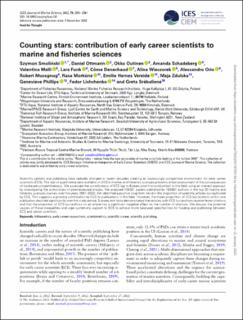| dc.contributor.author | Smolinski, Szymon | |
| dc.contributor.author | Ottmann, Daniel | |
| dc.contributor.author | Outinen, Okko | |
| dc.contributor.author | Schadeberg, Amanda | |
| dc.contributor.author | Melli, Valentina | |
| dc.contributor.author | Funk, Lara | |
| dc.contributor.author | Denechaud, Côme | |
| dc.contributor.author | Wieczorek, Alina | |
| dc.contributor.author | Orio, Alessandro | |
| dc.contributor.author | Mussgnug, Robert | |
| dc.contributor.author | Morkune, Rasa | |
| dc.contributor.author | Vereide, Emilie Hernes | |
| dc.contributor.author | Zdulska, Maja | |
| dc.contributor.author | Genevieve, Philips | |
| dc.contributor.author | Lishchenko, Fedor | |
| dc.contributor.author | Srebaliene, Greta | |
| dc.date.accessioned | 2023-02-07T10:02:48Z | |
| dc.date.available | 2023-02-07T10:02:48Z | |
| dc.date.created | 2022-12-01T14:17:44Z | |
| dc.date.issued | 2022 | |
| dc.identifier.citation | ICES Journal of Marine Science. 2022, 79 (9), 2351-2361. | en_US |
| dc.identifier.issn | 1054-3139 | |
| dc.identifier.uri | https://hdl.handle.net/11250/3048818 | |
| dc.description.abstract | Scientific careers and publishing have radically changed in recent decades creating an increasingly competitive environment for early career scientists (ECS). The lack of quantitative data available on ECS in marine and fisheries sciences prevents direct assessment of the consequences of increased competitiveness. We assessed the contributions of ECS (up to 6 years post first publication) to the field using an indirect approach by investigating the authorships of peer-reviewed articles. We analysed 118461 papers published by 184561 authors in the top 20 marine and fisheries sciences journals over the years 1991–2020. We identified a positive long-term trend in the proportion of scientific articles (co-)authored by ECS. This suggests a growing contribution by ECS to publications in the field. However, the mean proportion of ECS (co-)authors within one publication declined significantly over the study period. Subsequent tests demonstrated that articles with ECS (co-)authors receive fewer citations and that the proportion of ECS (co-)authors on an article has a significant negative effect on the number of citations. We discuss the potential causes of these inequalities and urge systematic support to ECS to achieve more balanced opportunities for funding and publishing between ECS and senior scientists. | en_US |
| dc.language.iso | eng | en_US |
| dc.title | Counting stars: contribution of early career scientists to marine and fisheries sciences | en_US |
| dc.title.alternative | Counting stars: contribution of early career scientists to marine and fisheries sciences | en_US |
| dc.type | Peer reviewed | en_US |
| dc.type | Journal article | en_US |
| dc.description.version | publishedVersion | en_US |
| dc.source.pagenumber | 2351-2361 | en_US |
| dc.source.volume | 79 | en_US |
| dc.source.journal | ICES Journal of Marine Science | en_US |
| dc.source.issue | 9 | en_US |
| dc.identifier.doi | 10.1093/icesjms/fsac187 | |
| dc.identifier.cristin | 2087173 | |
| dc.relation.project | Norges forskningsråd: 302675 | en_US |
| cristin.ispublished | true | |
| cristin.fulltext | original | |
| cristin.qualitycode | 2 | |
